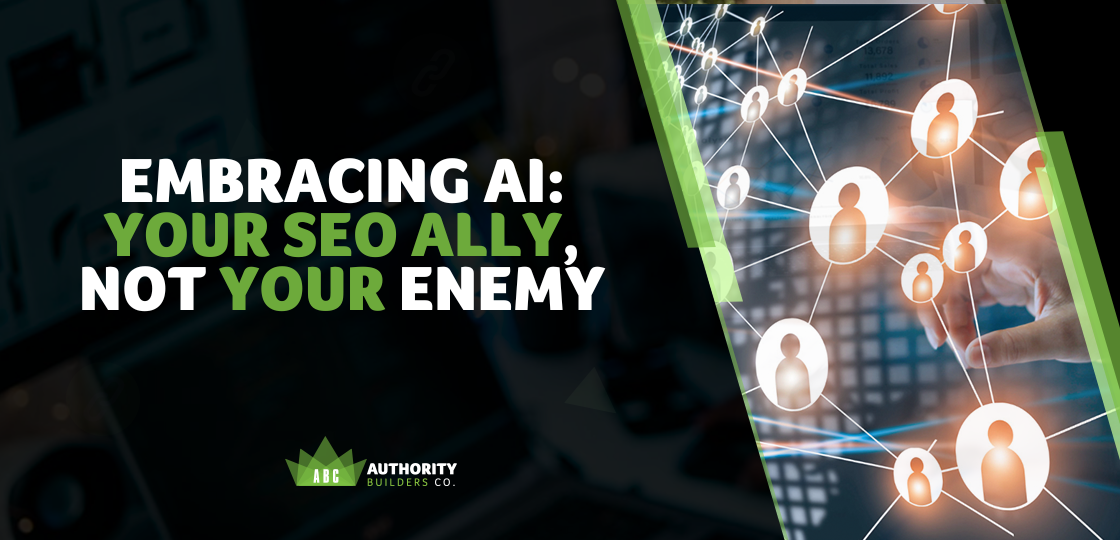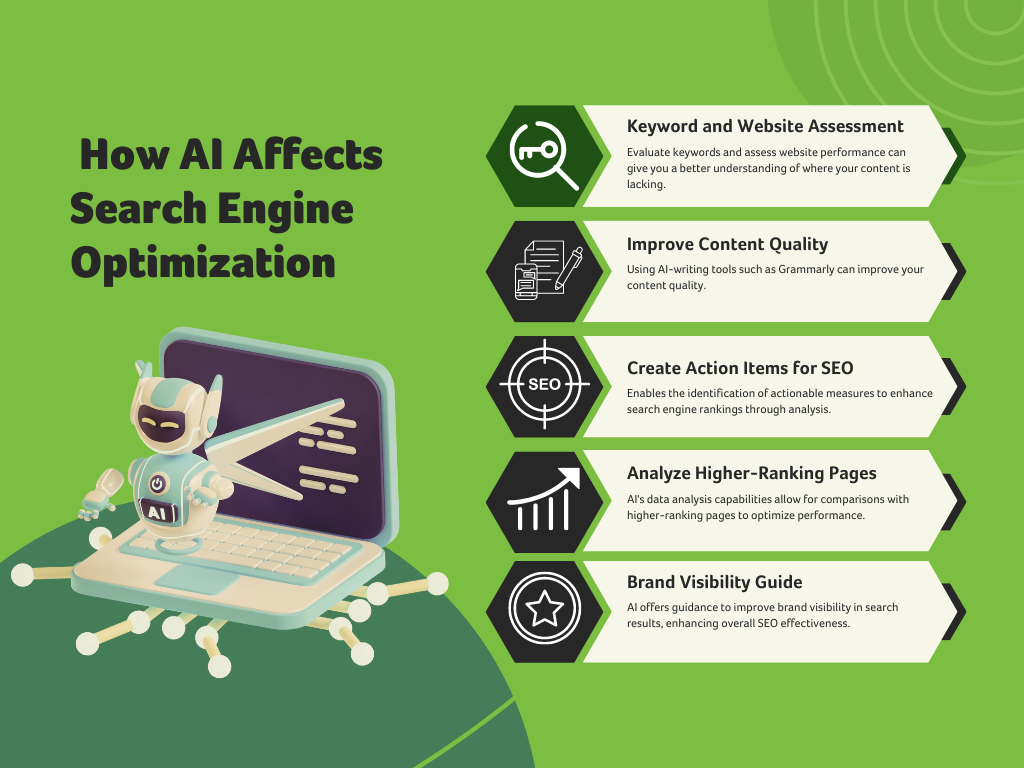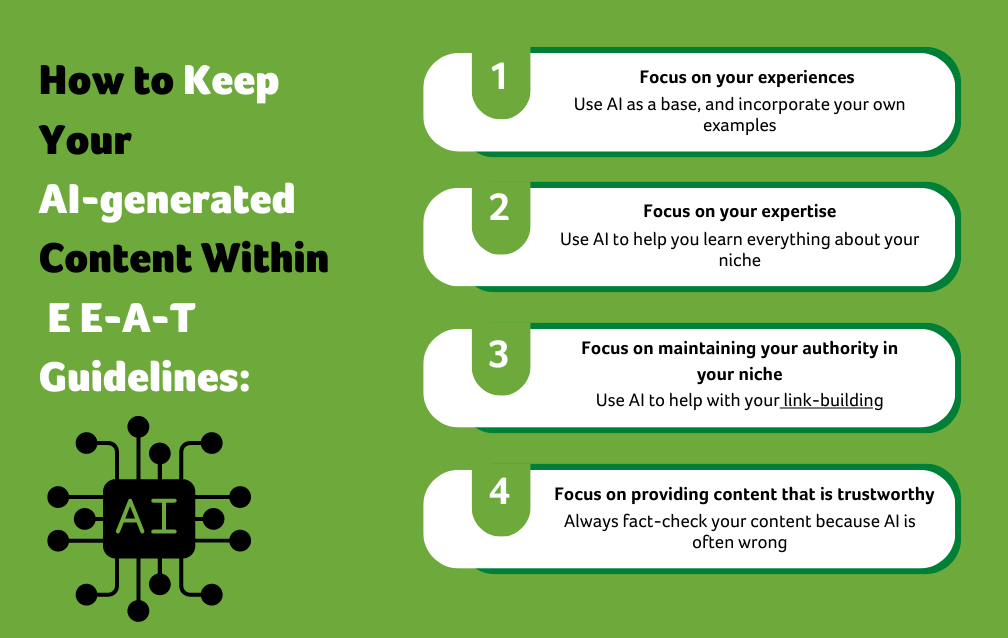
In the ever-evolving world of digital marketing, embracing new technologies is essential for staying ahead of the curve. That’s why it’s so important to embrace AI and understand that it is your SEO ally and not your enemy.
According to Statista, over 80% of professionals in the marketing industry incorporate AI technology in their online marketing endeavors. However, implementing AI-generated content remains challenging. 37% out of 1,000 marketers surveyed expressed their apprehension.
Those statistics indicate a growing interest among marketers and an ambition to leverage AI technology for content creation and optimization in the coming years. That means if your competitors are doing it, you should do it too, but better!
In this article, we will debunk the myth that AI is an enemy of SEO and instead showcase how it can be your most valuable tool.
Is AI-Generated Content a Threat to SEO?
Although AI has the potential to revolutionize the SEO landscape, it is unlikely that it will completely replace the entire profession. While AI can automate specific SEO tasks like the use of AI writing tools, analyzing keywords, and conducting technical site audits, the human touch remains indispensable.
The proficiency and inventiveness of SEO experts continue to be essential in devising and implementing effective strategies. AI functions as a valuable asset, complementing human capabilities instead of completely displacing them.
According to Google Search’s guidelines, utilizing AI-generated content or automation in a responsible and appropriate manner is not considered a violation.
Furthermore, it is crucial to note that the use of AI or automation should not be aimed at generating content solely for the purpose of manipulating search rankings. In fact, engaging in such practices would go against Google’s spam policies.
With that said, it’s vital to write high-quality content for people, but optimize for search results.
Here are a few tips for keeping your AI-generated content compliant with Google Search Guidelines:
- Create helpful content that is keyword-rich
- Use AI content generators during your content creation process to improve your existing content.
- Optimize key locations for keywords.
- Ensure crawlable links.
- Understand natural language processing and conversational keywords and incorporate that into your content writing.
- Promote your site in relevant communities.
- Follow best practices for different content types.
- Enable features to enhance the appearance of Google Search.
- Control content visibility in Google Search.
How Does AI-Generated Content Impact SEO?
Through the analysis of user behavior, AI has the ability to assess the most effective content and offer suggestions for its enhancement. Additionally, AI can assist in the generation of essential on-page elements like meta tags and headings that play a vital role in achieving SEO success.
While using AI can help you expand on your own ideas or help you create an ad or a fantastic meta description for your product page, it’s important to use AI the right way. According to a recent Hubspot survey, a significant percentage (22%) of marketers reported utilizing AI to generate ideas when creating marketing content.
When done correctly, AI-generated content can improve your workflow and your rankings. As a note, this approach doesn’t come without risks of being devalued by search engine algorithms if your content goes against Google’s guidelines.
With that said, the content generated by AI often lacks originality as it relies on copying and paraphrasing from various online sources.
The data on which AI is trained is not updated in real time. This limits its ability to adapt to current trends and developments such as news alerts. Another drawback is the absence of emotions in AI, which is crucial for understanding and addressing user intent effectively.
So, what’s the impact of all this?
The impact of AI-generated content
Personalized search results stand as a prominent consequence of AI’s influence on SEO. Through the utilization of AI algorithms, user search history, location, and behavior can be scrutinized to deliver tailored outcomes.
Consequently, SEO tactics need to prioritize crafting content that caters to specific target audiences, moving away from generic or shady SEO approaches.
Furthermore, AI is making a notable impact on the SEO sector, and its influence is projected to persist in the coming years. Through the adoption of AI-powered tools and technologies, companies can enhance the visibility, rankings, and overall performance of their websites in search engines.
This allows them to maintain a competitive edge in the industry. Additionally, a significant majority of marketers, around 70%, expressed the importance of generative AI in their content marketing strategies.

Here are a few ways artificial intelligence is affecting SEO:
- Using AI-powered tools to evaluate keywords and assess website performance can give you a better understanding of where your content is lacking.
- Using AI-writing tools such as Grammarly can improve your content quality.
- Using AI to enable the identification of actionable measures to enhance search engine rankings through analysis.
- AI’s data analysis capabilities allow for comparisons with higher-ranking pages to optimize performance.
- AI offers guidance to improve brand visibility in search results, enhancing overall SEO effectiveness.
Notably, Google’s AI-powered algorithms, such as BERT and Rankbrain, play a significant role in this process.
AI Content and E E-A-T Guidelines
AI-generated content is becoming increasingly prevalent. However, concerns about the quality and accuracy of AI content have also emerged.
The recently introduced E-E-A-T acronym, which stands for Experience, Expertise, Authoritativeness, and Trustworthiness, has brought significant changes to Google’s search quality rater guidelines.
Essentially, the concept of E E-A-T revolves around highlighting the firsthand experience you possess within your niche, which has become a ranking factor that Google now prioritizes when evaluating content. Demonstrating your personal expertise and knowledge in your content has become increasingly important in order to meet Google’s standards and enhance your content’s visibility.
Here’s how to keep your AI-generated content within E E-A-T guidelines:
- Focus on your experiences: use AI as a base, and incorporate your own examples.
- Focus on your expertise: use AI to help you learn everything about your niche.
- Focus on maintaining your authority in your niche: use AI to help with your link-building.
- Focus on providing content that is trustworthy: always fact-check your content because AI is often wrong.

These updated guidelines provide valuable insights into how quality raters assess the expertise of content creators.
By emphasizing experience, expertise, authority, and trustworthiness, Google aims to ensure the evaluation of content creators aligns with these crucial factors. The point is, as long as your AI-generated content adheres to Google’s E E-A-T guidelines, you’re good to go!
Human-Written Content vs. AI-Generated Content
While adhering to E-EAT guidelines ensures that AI-generated content meets the criteria of expertise, authoritativeness, and trustworthiness, there remains an ongoing and heated debate surrounding human-written content vs AI-generated content.
Advocates of human-written content emphasize the value of human creativity, emotional intelligence, and the ability to deliver unique perspectives. They argue that humans can capture nuances, context, and tone in a way that AI algorithms struggle to replicate.
On the other hand, proponents of AI-generated content highlight its efficiency, scalability, and potential to generate vast amounts of content quickly and effectively. Many argue that AI algorithms can analyze data, identify patterns, and produce content that is tailored to specific requirements which makes it a threat to the human workforce.
Human writers
In spite of the progress made in AI technology that can generate content, there remains a role for humans in the creation of content.
Humans contribute a unique blend of creativity, emotion, and subtlety that can be challenging for AI-generated text to imitate and create articles with the same type of personality that is expressed in writing tones.
The capacity to forge an emotional bond with readers is a distinguishing factor that sets human-generated content apart from AI-generated content.
Further, using AI-generated content won’t replace the need for the human touch, it will simply make it better.
AI-Generated content
Rather than perceiving AI-generated text as a menace to humans, it can be regarded as a chance for cooperation. Such as helping with content ideas. Several organizations, such as Copymatic.ai, have devised tools that merge the efficacy of AI with the ingenuity and sentiment of humans.
Here are some tips for using AI content generator tools:
- Generate writing prompts and ideas
- Provide grammar and spelling checks
- Offer suggestions for sentence structure and style
- Generate summaries and abstracts
- Aid in research and marketing campaigns
- Generate SEO-optimized headlines and meta descriptions
- Help with s blog post outline
- Generate alternative word choices and synonyms
- Assist in editing and proofreading
- Analyze readability and effectiveness
- Help with content generation for various platforms
- Provide real-time writing assistance
Through collaborative efforts, AI and human writers can produce content that is not only captivating but also efficient, thereby enhancing the overall content creation procedure.
The bottom line
While SEO is thriving because of artificial intelligence, a significant portion of individuals such as content marketers, amounting to 77%, have voiced their worries regarding the potential job losses that may be caused by AI within the upcoming year.
This widespread concern reflects the prevailing apprehension surrounding the impact of technology on employment prospects.
Many people have fears regarding AI, but based on research conducted by the World Economic Forum, it is estimated that the emergence of AI will actually give rise to approximately 97 million job opportunities. This projection offers a potential counterbalance to concerns about workforce displacement.
While the debate continues, it’s difficult to ignore the success of AI tools in the SEO industry. These tools analyze content quality, validate information, optimize keywords, and provide valuable user behavior data. As a result, they contribute to improved website rankings, enhanced user experience, and overall SEO performance.
How To Use AI-Generated Content in Your SEO Strategy
AI tools can be employed in the content creation process, but it is essential to conduct a human edit before finalizing and publishing the content.
It is best to try to approach AI-generated content with a critical eye and scrutinize its accuracy. Fact-checking should be performed to ensure the reliability of the information before sharing it with the audience.
AI content marketing refers to the integration of AI and machine learning programs into content tools, offering a range of benefits across content planning, creation, distribution, analysis, and reporting. By leveraging AI, these content marketing tools enhance the overall quality and effectiveness of content marketing strategies.
Here are some effective tips for strengthening your AI-generated content:
- Provide clear instructions/prompts for your AI content generator.
- Use high-quality input data.
- Create high-quality product descriptions.
- Review and edit your blog post, and social media posts.
- Incorporate human creativity.
- Refine and iterate.
- Combine AI content tools with human input.
- Stay updated on AI advancements.
With that said, our content creation services ensures that all our native language content writers deliver exceptional quality without compromising readability or resorting to keyword stuffing. With our SEO-focused approach that is SurferSEO optimized, you can expect top-notch written content that captivates readers while boosting your search engine rankings.
Let’s Wrap It Up
In today’s digital landscape, the use of AI content generation tools for automatically generated content has become an integral part of the content marketing process. AI is not the enemy, it is a tool that can be used to create and refine the creative process. These AI content generators offer a multitude of benefits, such as efficient creation of ad copy, improved search engine optimization, and enhanced productivity.
While human writers undoubtedly bring unique perspectives and creative insights to the table, AI tools have proven their worth in augmenting and streamlining the content creation workflow. By leveraging AI-generated content alongside human expertise, businesses can achieve a harmonious balance that maximizes efficiency and effectiveness.
